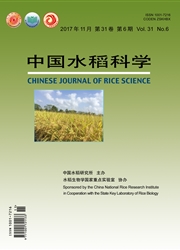

 中文摘要:
中文摘要:
水稻颖花原基分化期高温可抑制颖花分化,导致每穗粒数下降,最终会影响水稻产量的形成。以杂交稻甬优12为材料,探讨高温下不同浓度水杨酸(salicylic acid,SA)对水稻颖花分化的影响,并揭示其作用机制。研究表明,常温下适量SA促进水稻颖花分化,但高浓度SA严重降低每穗粒数。然而高温下,10~50000μmol/L SA处理每穗粒数均高于对照。无论常温或高温,100μmol/L水杨酸处理效果最好,其每穗粒数及产量均显著高于对照。SA增强水稻耐热性表现在三个方面:1)高温下SA处理的叶片实际荧光量子效率及净光合速率均高于对照;2)高温下SA处理的颖花SOD、POD及CAT活性显著高于对照,而MDA含量则显著低于对照;3)无论高温或常温,SA处理的颖花ZR及IAA含量均高于对照,尤其在高温下,差异达显著水平。
 英文摘要:
英文摘要:
Heat stress at the spikelet primordium differentiation stage of rice significantly decreases the grain yield due to reduced grain number per panicle.The hybrid rice Yongyou 12 was used as material to investigate the role of salicylic acid(SA)in alleviating the negative effect on spikelet differentiation induced by heat stress.The results indicated that under natural conditions,low concentration of SA increased the spikelet number per panicle,while high concentration decreased the number.Interestingly,either low or high concentrations of SA(10-50000μmol/L)increased the grain number per panicle under heat stress.The grain yield and grain number per panicle peaked under the treatment of 100μmol/L SA compared with their respective control(0μmol/L)under both natural conditions and heat stress.This might attribute to the increase in the leaf photosynthesis rate,antioxidant enzyme activities,concentrations of auxin(IAA)and zeatin(ZR)in spikelets under heat stress.Heat stress occurred at spikelet differentiation stage seemed to cause little damage to the leaf,but the actual light quantum efficiency and net photosynthetic rate of leaf were increased when sprayed with SA.Accordingly,there was no significant difference in the activities of SOD,POD and CAT of leaf in rice.However,these antioxidant enzyme activities in spikelets were significantly decreased when subjected to heat stress,especially under the treatment of 0μmol/L SA,suggesting that SA could enhance anti-oxidation.Further,SA could also prevent the decrease in the concentrations of IAA and ZR in spikelets induced by heat stress.In sum,SA obviously enhanced heat-resistance in rice at 100-1000μmol/L.
 同期刊论文项目
同期刊论文项目
 同项目期刊论文
同项目期刊论文
 期刊信息
期刊信息
